Following the “greatest shock in aviation history”, regular air travellers are breathing a sigh of relief as they flock back to the skies for business or leisure. But who is regulating the soaring carbon emissions from an industry that continues to resist mandatory curbs?
Based on both its direct carbon emissions and unique contrail emissions, commercial aviation is responsible for somewhere between 3% to 5% of human-induced global climate forcing — more than France or Australia alone.
And though air transport advocates often present this form of travel as a ubiquitous activity by a large share of the world population, a recent analysis of industry data and national surveys suggests that the most frequent fliers — at most, 1% of the world population — likely account for more than half of the total emissions from commercial air travel.
The analysis found that while the most frequent travellers in the US can generate up to 318 tons of CO2 per person annually, and those in Luxemburg, Singapore, Saudi Arabia and Canada over 200t CO2/year, low emitters in many parts of Africa emit a mere 0.1t CO2 per year.
Now, with the lifting of Covid travel restrictions, global air transport demand has bounced back fast and is expected to triple by 2050.
However, due to the transnational nature of its emissions, the industry has evaded binding carbon reductions under both the 1997 Kyoto Protocol and the subsequent 2015 Paris Agreement under the United Nations Framework Convention on Climate Change.
Instead, regulation of this sector was left under the wing of a separate UN body, the International Civil Aviation Organisation (ICAO).
Corsia initiative
Finally, in 2016, ICAO members announced the Corsia initiative (Carbon Offsetting and Reduction Scheme for International Aviation), the first global market-based measure to curb emissions outside national or regional regulatory action.
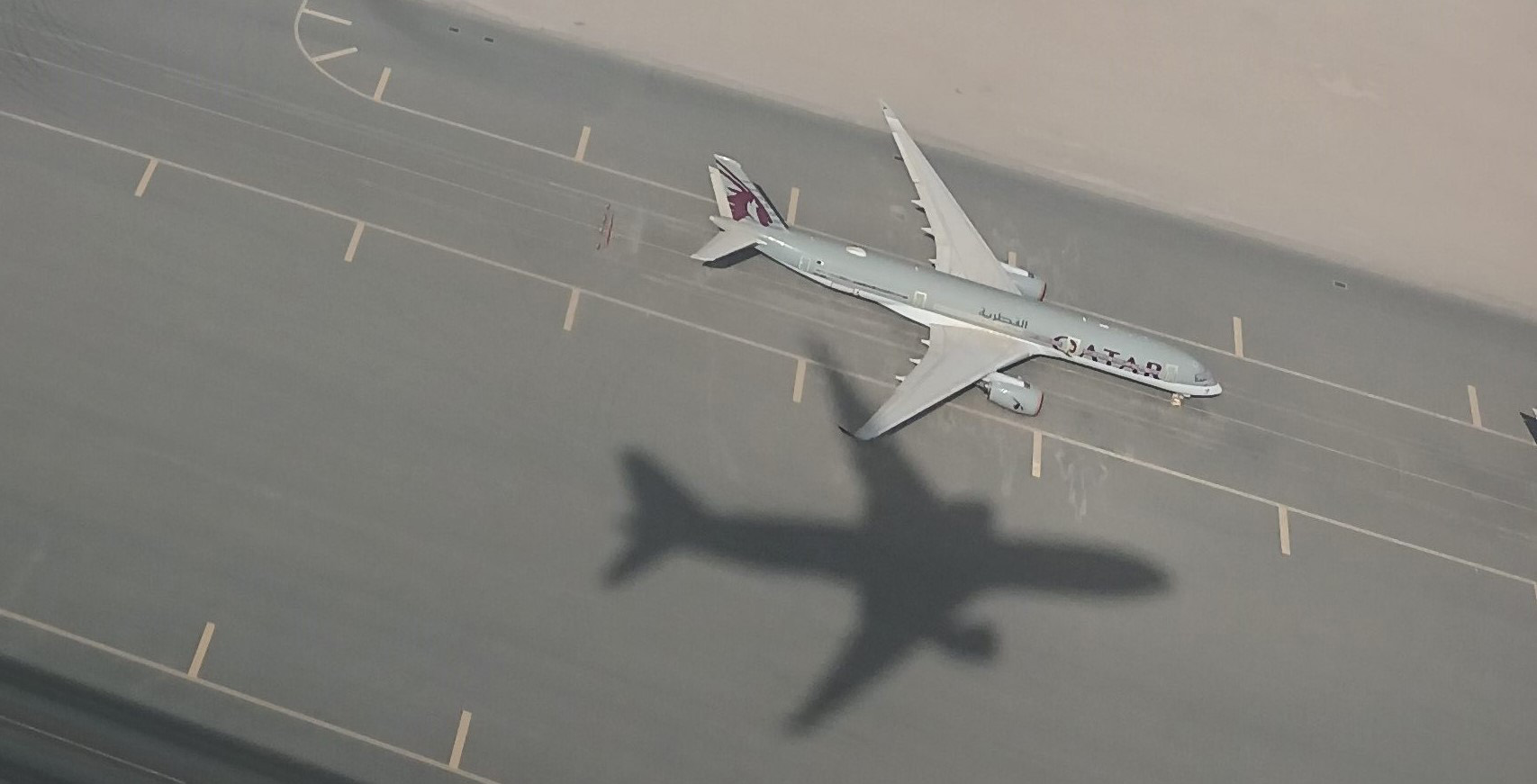 A Qatar Airlines cargo flight takes off from Doha’s Hamad International Airport (Photo: Tony Carnie)
A Qatar Airlines cargo flight takes off from Doha’s Hamad International Airport (Photo: Tony Carnie)
According to ICAO, this new approach provides a harmonised way to reduce emissions from international aviation, while minimising market distortion and respecting the “special circumstances and respective capabilities of ICAO member states”.
The scheme has three phases: a voluntary pilot phase scheduled to run from 2021-2023, followed by phase 1 (2024-2026) where states can also volunteer to participate; followed by a phase 2 (2027-2035), which covers all states that have a share above 0.5% of total global passenger traffic.
Last year, the International Air Transport Association (IATA) went a step further by announcing a new Net Zero by 2050 scheme which it says is aligned with the Paris Agreement to limit global warming to 1.5°C.
IATA director general Willie Walsh hailed this resolution as “a momentous decision” by the world’s largest airlines to ensure that flying becomes environmentally sustainable.
“Achieving net zero emissions will be a huge challenge. The aviation industry must progressively reduce its emissions while accommodating the growing demand of a world that is eager to fly,” said Walsh.
“To be able to serve the needs of the 10 billion people expected to fly in 2050, at least 1.8 gigatons of carbon must be abated in that year.
“Moreover, the net zero commitment implies that a cumulative total of 21.2 gigatons of carbon will be abated between now and 2050.”
Sustainable Aviation Fuel
To achieve this, IATA members hope to abate their carbon emissions mainly via a massive switchover from conventional kerosene jet fuel to Sustainable Aviation Fuel (SAF) made from old cooking oil or farm and municipal waste.
“A potential scenario is that 65% of this will be abated through SAF. We would expect new propulsion technology, such as hydrogen, to take care of another 13%. And efficiency improvements will account for a further 3%,” said Walsh.
“The remainder could be dealt with through carbon capture and storage (11%) and offsets (8%). The actual split, and the trajectory to get there, will depend on what solutions are the most cost-effective at any particular time.”
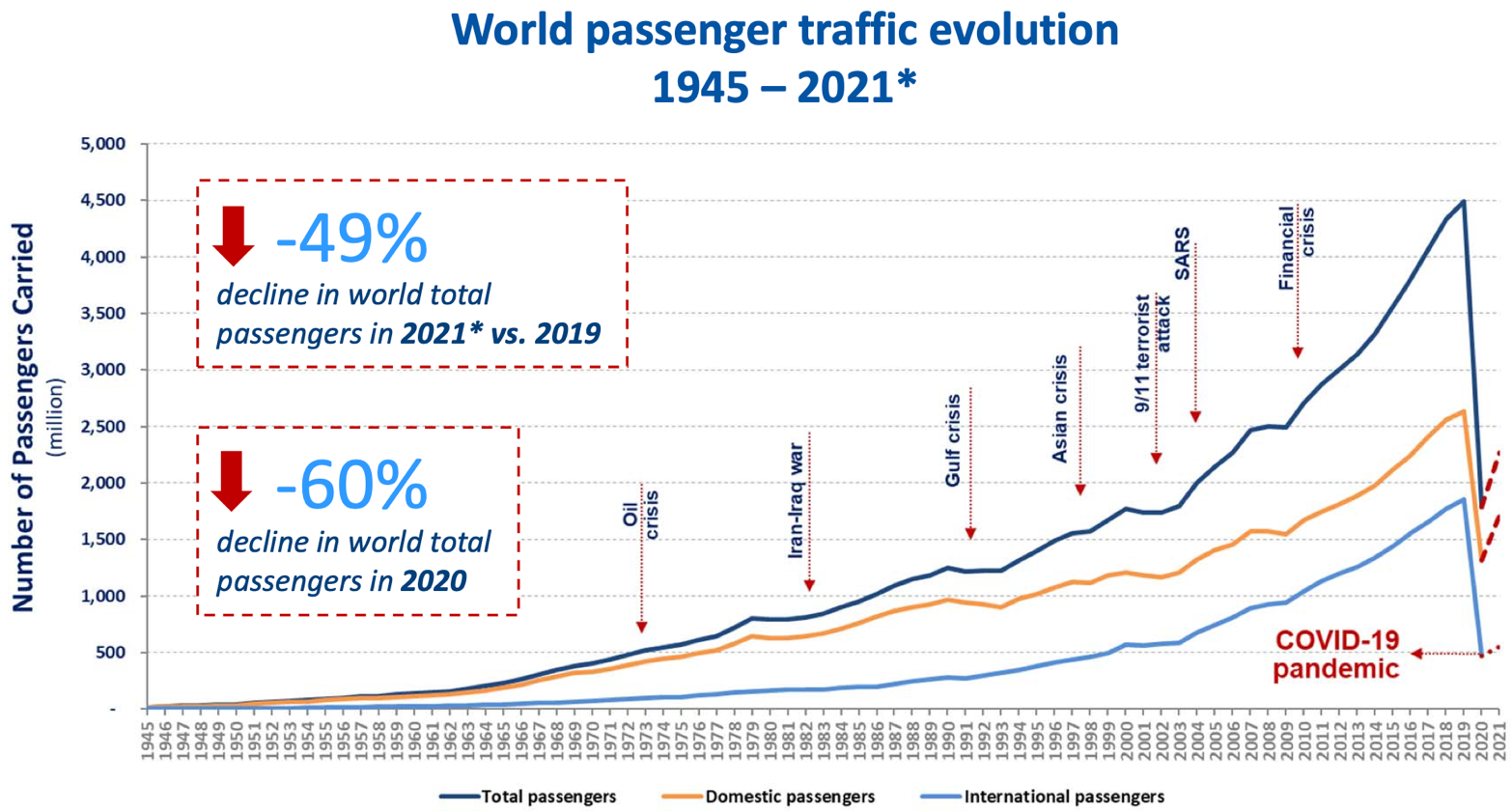 (Source: ICAO)
(Source: ICAO)
However, this sense of optimism is not shared by either the European Commission or the Brussels-based Transport and Environment (T&E) lobby group which campaigns for cleaner transport policies.
Earlier this month, the EU Parliament voted to expand the scope of its emissions trading scheme (EU ETS) to include all international departures from Europe from 2024.
Tougher action
This move towards tougher action by the European Union follows similar action in 2012 that was abandoned after Chinese airlines refused to pay charges for carbon emissions on flights to and from Europe.
IATA has also voiced its “surprise and concern” at Europe’s recent move away from the Corsia agreement, warning that this would distort competition and weaken the global competitive position of EU airlines and hubs.
William Todts of T&E said: “It’s absurd that people flying to Madrid or Budapest have to pay carbon taxes, but far more polluting trips to New York or Singapore are exempt.
“Long-distance flights generate the largest chunk of aviation emissions and contrails. It’s about time the EU puts an end to this anomaly and starts addressing all of aviation’s emissions in its carbon market.”
His colleague Jo Dardenne argues that long-haul polluting flights have been left off the hook for long enough and that if governments are serious about tackling the aviation industry’s climate problem, they must no longer bow to the demands of industry lobby groups such as IATA.
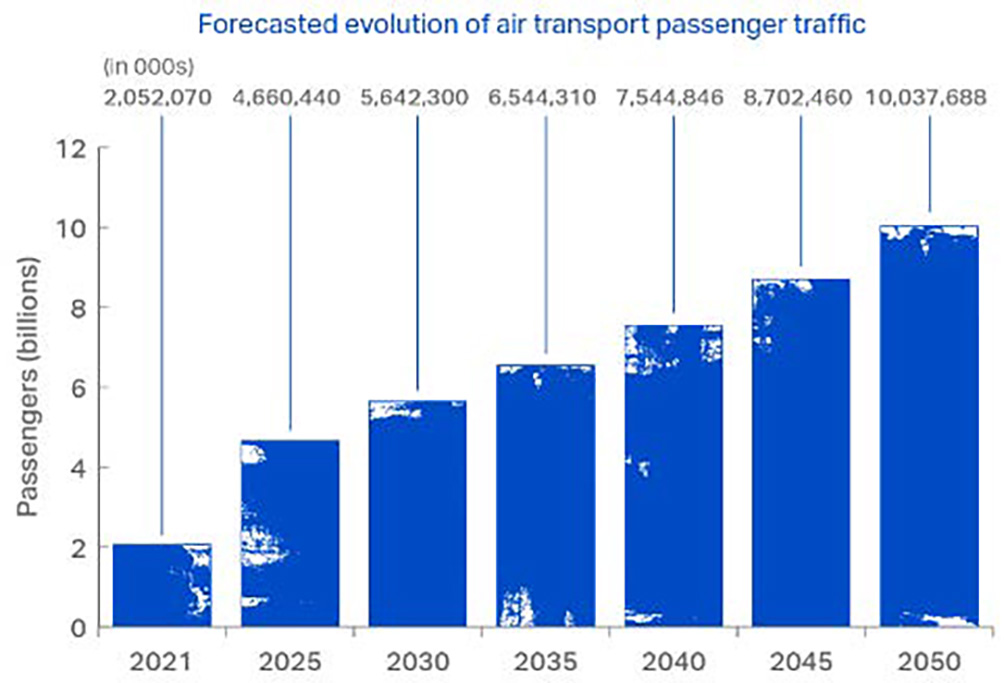 Commercial air transport plunged to historic lows during Covid-19 travel restrictions, but demand has bounced back fast and is expected to triple by 2050. (Source: ICAO)
Commercial air transport plunged to historic lows during Covid-19 travel restrictions, but demand has bounced back fast and is expected to triple by 2050. (Source: ICAO)
In 2020, a study commissioned by the European Commission found major flaws in the Corsia system, suggesting it was possibly one of the weakest options available from a climate change perspective.
“We find that there are a number of features of Corsia which imply its level of ambition for the international aviation sector is misaligned with, and weaker than the global level of ambition required to keep within the temperature goals of the Paris Agreement…
“Corsia is less ambitious than the regulation of aviation within the EU ETS,” said the study.
Offset programme questions
It also questioned the quality of offset programmes approved by Corsia and raised concerns that carbon credits could be recycled or “double-counted”.
The principle of carbon offsets as a solution to the climate crisis has also been widely questioned, with some commentators likening this to a scheme in which the obese get others to lose weight on their behalf.
Though Corsia aimed to drive carbon-neutral growth, the European Commission study suggests the targets were unlikely to be achieved because participation was likely to be partial, rather than complete, “and the ability of ICAO to enforce compliance with the scheme is limited”.
“Corsia is unlikely to materially alter the direct climate impact associated with air travel as the price signal that airlines will face under the scheme is, on its own, not expected to provide sufficient financial incentives for them to reduce emissions materially.
“We find there is a risk the scheme may only provide a limited climate benefit compared to the case in which international aviation emissions remain unregulated.”
Nor are there guarantees that IATA’s voluntary Net Zero by 2050 plan can lower emissions significantly — or rapidly.
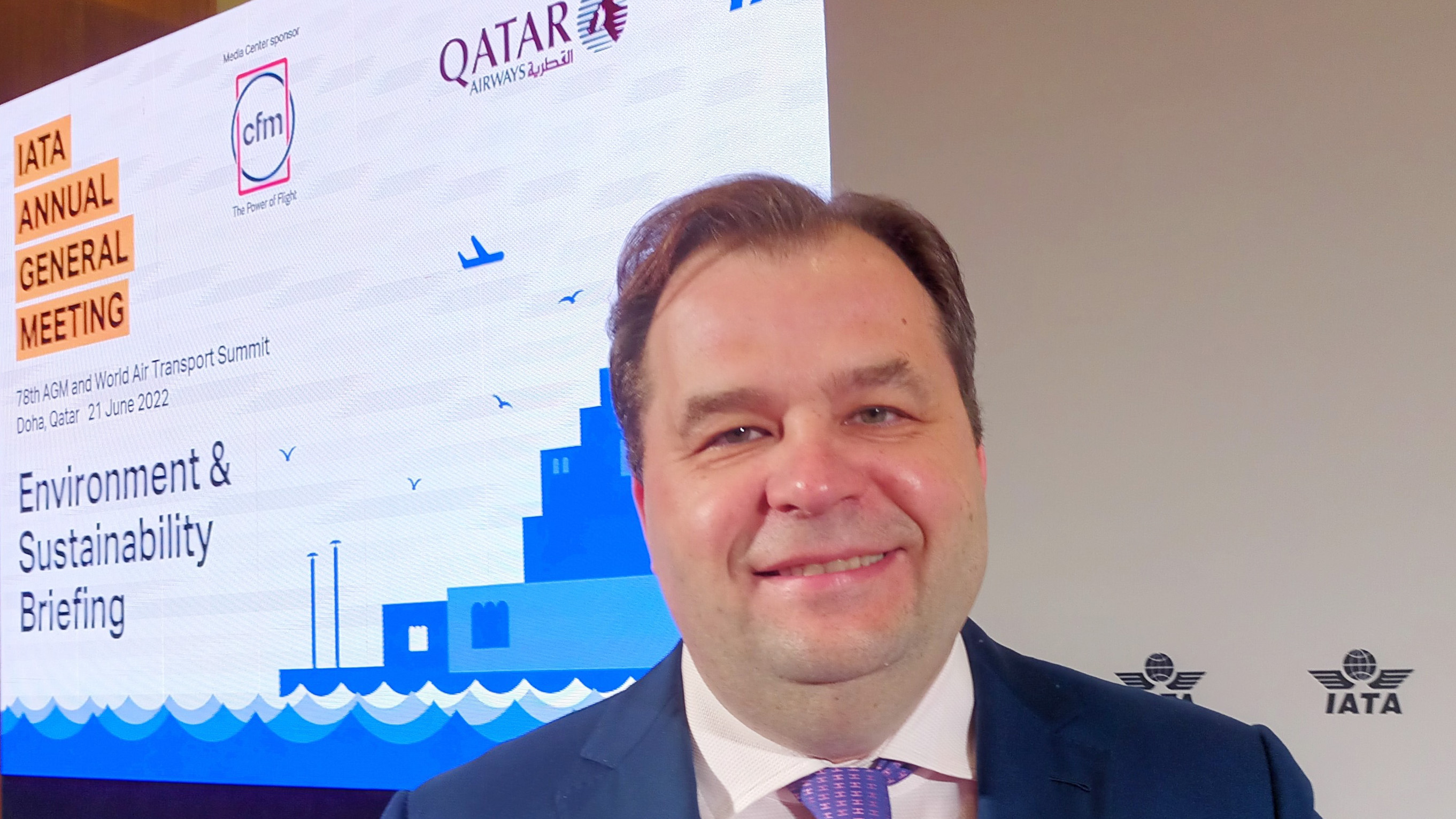 The International Air Transport Association’s environment and sustainability head Sebastian Mikosz says his association remains firmly opposed to ‘legal or punitive approaches’ to tackling aviation industry emissions. (Photo: Tony Carnie)
The International Air Transport Association’s environment and sustainability head Sebastian Mikosz says his association remains firmly opposed to ‘legal or punitive approaches’ to tackling aviation industry emissions. (Photo: Tony Carnie)
At a media briefing in Doha, Qatar, on 21 June, IATA environment and sustainability head Sebastian Mikosz told journalists that the industry was pinning most of its hopes on the global availability of new and ample supplies of sustainable aviation fuels (SAF) with a lower carbon footprint.
But this means that airlines have a very steep mountain to climb.
Reaching aviation’s net zero commitment would require an annual production capacity of 449 billion litres of SAF — whereas current annual production is a mere trickle at 125 million litres.
Mikosz says this new type of fuel also costs more than twice that of conventional fuel, so major government incentives were needed to lower prices and increase volumes dramatically.
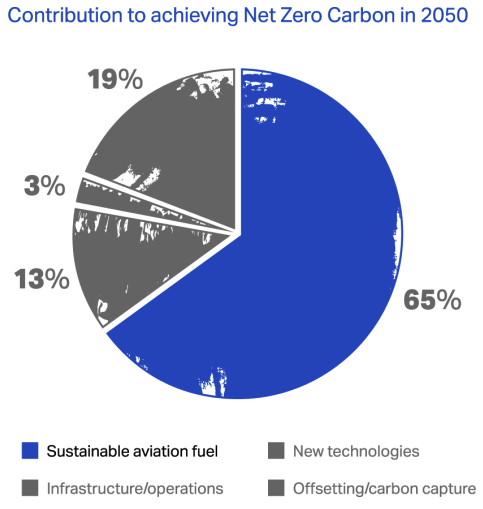 The IATA is pinning its hopes on abating 65% of its climate emissions through ‘sustainable aviation fuels’ along with new propulsion technology, such as hydrogen, to take care of another 13%. Efficiency improvements would account for a further 3%. The remainder could be dealt with through carbon capture and storage (11%) and offsets (8%)
The IATA is pinning its hopes on abating 65% of its climate emissions through ‘sustainable aviation fuels’ along with new propulsion technology, such as hydrogen, to take care of another 13%. Efficiency improvements would account for a further 3%. The remainder could be dealt with through carbon capture and storage (11%) and offsets (8%)
Incentives before threats
In response to questions from Our Burning Planet, Mikosz said: “I don’t think a legally binding mechanism will be efficient… We are absolutely against any legal or punitive approaches.”
Financial incentives, coupled with customer pressure, formed a far better approach to tackling aviation emissions than threats of jail terms for airline CEOs, he suggested.
Critics further question whether the SAF route is indeed “sustainable”, particularly if it is derived from the expansion of biofuels (biologically based plant fuels).
The Washington DC-based International Council on Clean Transportation suggests that lignocellulosic biomass can offer substantial greenhouse gas reductions as an alternative feedstock — but its supply is eventually limited by global land area.
It quotes a 2014 study which estimated that the maximum plausible limit to global biomass availability in 2050 from energy crops, forestry, crop residues and waste would require the conversion of virtually all unused grassland and savannah, and it would result in extensive land use changes and biodiversity loss on a global basis.
And, as noted by T&E, most airlines are likely to opt for lower-cost carbon offset credits if given a choice.
“This means that Corsia wouldn’t even incentivise emissions reductions within the aviation sector, as it is cheaper for airlines to continue polluting and buying offsets than actually reducing emissions by using clean fuels,” the lobby group argues.
T&E’s Jo Dardenne said: “It’s no news that legacy carriers have enjoyed preferential treatment under EU climate measures. They make crowd-pleasing pledges of net-zero emissions, which is music to the ears of their investors and customers.
“But in the background, they send the International Airlines Group and IATA to do their dirty work: lobby to weaken the EU’s climate package so they can continue to pollute for free.”
“We cannot wait for another 10 years to tackle aviation’s climate problem, and less so with an offsetting scheme that has already been proven ineffective,” she argued. DM/OBP
[hearken id="daily-maverick/9419"]




 The IATA is pinning its hopes on abating 65% of its climate emissions through ‘sustainable aviation fuels’ along with new propulsion technology, such as hydrogen, to take care of another 13%. Efficiency improvements would account for a further 3%. The remainder could be dealt with through carbon capture and storage (11%) and offsets (8%)
The IATA is pinning its hopes on abating 65% of its climate emissions through ‘sustainable aviation fuels’ along with new propulsion technology, such as hydrogen, to take care of another 13%. Efficiency improvements would account for a further 3%. The remainder could be dealt with through carbon capture and storage (11%) and offsets (8%)